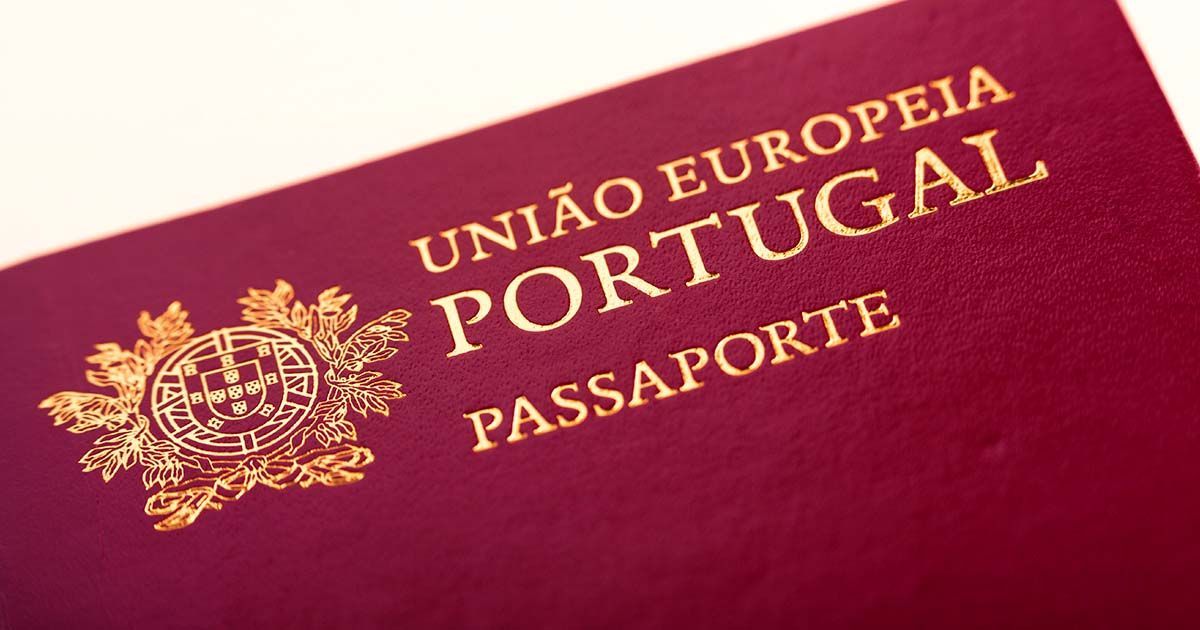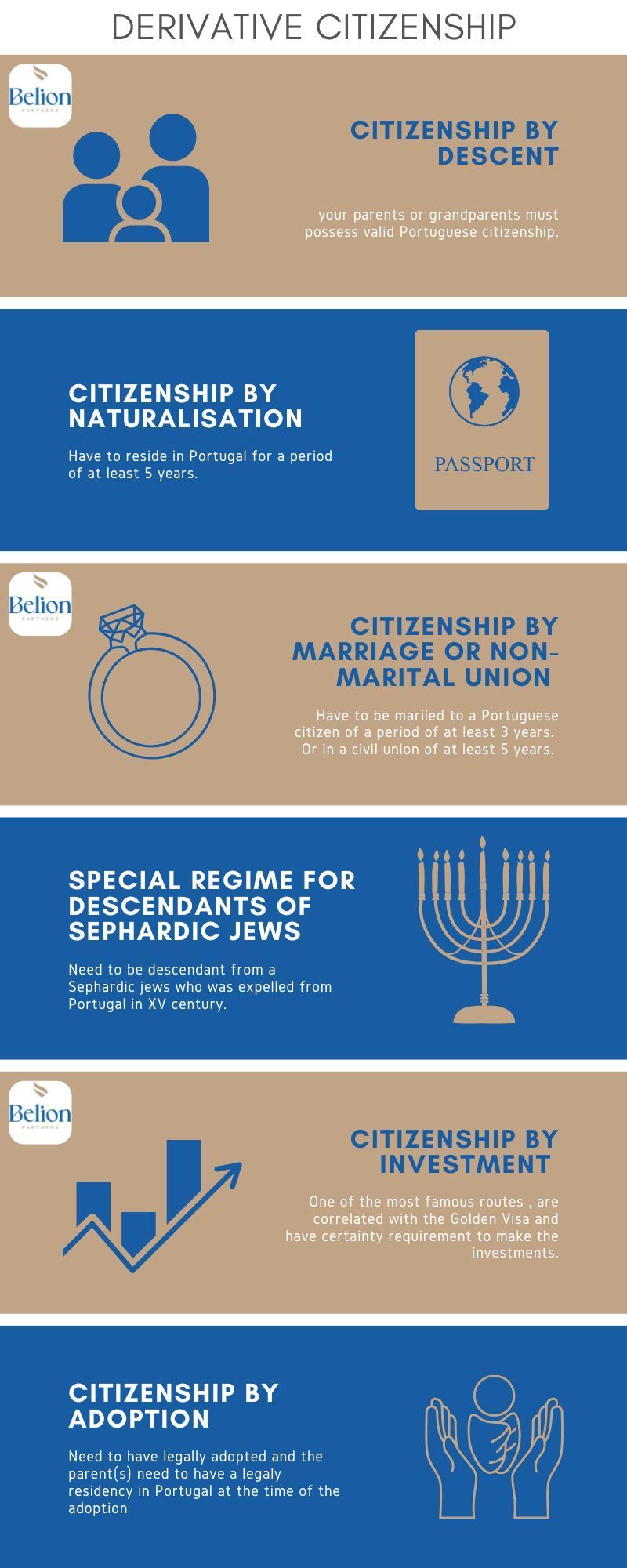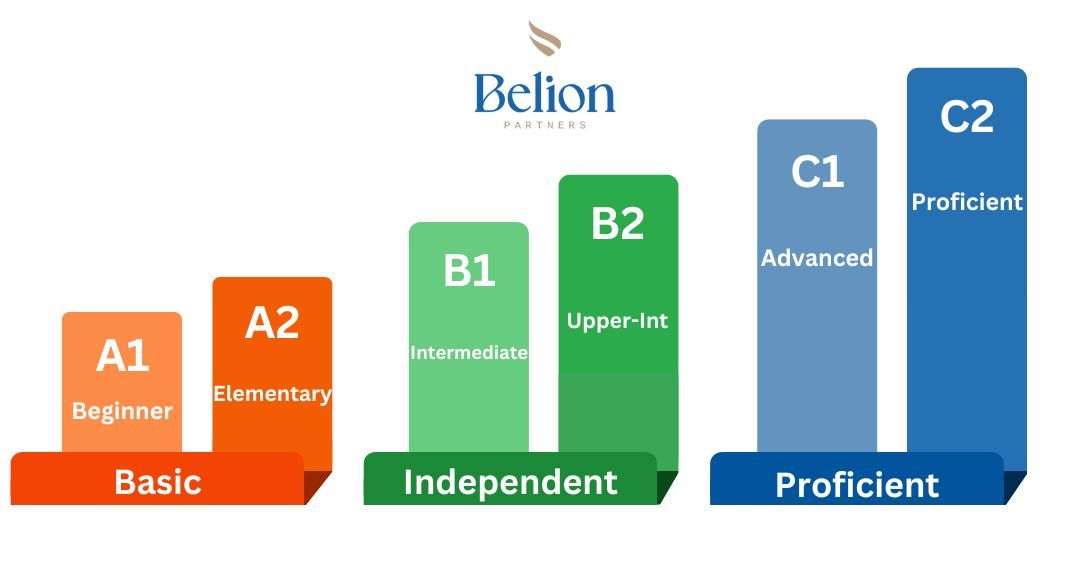Portuguese Citizenship
Portuguese citizenship entitles one to live, work, and study in all EU countries and access to other Portugal citizens’ rights, such as education, healthcare and social security.
What's on This Page
- Routes to Acquire Portuguese Citizenship?
- Why Portugal?
- The Two Different Portuguese Citizenships
- What Is Citizenship by Origin?
- What Is Derivative Citizenship?
- Citizenship by Naturalisation
- Citizenship by Marriage or Non-Marital Union
- Special Regime for Descendants of Sephardic Jews
- Citizenship by Investment
- Citizenship by Descent
- Citizenship by Adoption
- Derivative Citizenship Infographic
- How to Acquire Portuguese Citizenship?
- Portuguese Citizenship: Why Request It?
- What Is the Portuguese Citizenship Language Test?
- Simplified Graphic of Portuguese CEFR Levels
- Documents Required for Citizenship
- How Do I apply for Portuguese citizenship?
- Frequently Asked Questions
- How Can Belion Assist with Obtaining Portuguese Citizenship?
Routes to Acquire Portuguese Citizenship?
Portuguese citizenship can be achieved through various routes, which vary depending on particular circumstances of the applicant. It is a good option since the Portuguese passport stands prominently among the world's most esteemed travel documents, facilitating seamless international mobility. Adding to this, Portugal has a robust and stable economy, and ongoing initiatives aimed at modernising immigration legislation, offering a favourable environment for prospective citizens.
The best option available may differ based on factors such as residency status, family ties, or professional qualifications. It is important to carefully consider all available options before deciding on the most appropriate route to pursue.
For those contemplating the prospect of Portuguese citizenship, it is necessary to thoroughly explore all available options before embarking on the application process.

Why Portugal?
Portugal stands out for its serene atmosphere and exceptional quality of life, drawing admiration from around the world. As a well-integrated global player with a notably high human development index, it emerges as a prime choice for individuals contemplating a move abroad.
Being among Europe's earliest nations, Portugal exudes historical richness, pulsating with a vibrant cultural tapestry and
culinary delights. Basking in plentiful sunshine and graced with breathtaking coastlines,
its beaches receive widespread acclaim in specialised publications. Furthermore, its idyllic countryside beckons, inviting exploration of nature's wonders at every turn.
The Two Different Portuguese Citizenships
In Portugal, there are two types of citizenship recognised by the law - citizenship by origin or citizen by birth and derivative citizenship. Citizenship by origin refers to individuals who have Portuguese ancestry or a direct connection to Portugal, while derivative citizenship is granted to individuals who have fulfilled certain conditions, such as marriage to a Portuguese citizen or long-term residency in the country. These distinctions are put in place to regulate citizenship and ensure fairness in the process.
What Is Citizenship by Origin?
Portuguese citizenship by birthright is conferred upon individuals born within the territorial boundaries of Portugal. Additionally, those born outside Portugal may qualify for Portuguese citizenship by birthright if at least one parent is a Portuguese citizen.
In certain scenarios, such as when a child is born to parents serving the Portuguese state overseas, the child is also deemed to be a Portuguese citizen by inheritance. Furthermore, individuals may be eligible for Portuguese citizenship by origin if they have a grandparent who has not renounced their Portuguese citizenship.
To fulfil this requirement, various criteria must be met. Besides, numerous public entities oversee these applications, making it advisable to engage a legal representative for expedited and accurate processing.
What Is Derivative Citizenship?
Derivative citizenship encompasses all alternative avenues for obtaining Portuguese citizenship. This category includes:
- Legal residency in Portugal for 5 years.
- Citizenship by marriage.
- Special regime for descendants of Sephardic Jews.
- Citizenship by investment.
- Citizenship by descent.
- Citizenship by adoption.
Citizenship by Naturalisation
One of the most common ways to acquire Portuguese citizenship is by naturalisation. If you reside in Portugal for a period of 5 years, you can apply for Portuguese citizenship. However, the applicant needs to meet other requirements to attain citizenship. Other prerequisites include:
- Being older than 18 years old or emancipated under Portuguese law.
- Having sufficient knowledge of the Portuguese language, with the required level under the European framework (CEFR) being A2, which corresponds to the second degree of a basic user.
- Not having been convicted with a sentence of 3 years or more in prison for a crime punishable by Portuguese law.
- Not constituting a danger or threat to Portugal's national security, meaning not being involved in terrorist practices under Portuguese law.

Citizenship by Marriage or Non-Marital Union
In accordance with Portuguese Law, there exists a legal avenue through which a foreign individual who has been married to a Portuguese citizen for a period exceeding three years may seek to acquire Portuguese citizenship.
Moreover, individuals engaged in a longstanding civil partnership with a Portuguese citizen for more than three years possess the opportunity to obtain Portuguese nationality by initiating a formal action to have their union recognised in the civil court. This particular provision serves a crucial purpose in acknowledging and safeguarding the rights of individuals who have established a substantial life in Portugal alongside a Portuguese partner, regardless of their nationality.
Special Regime for Descendants of Sephardic Jews
This special regime was instituted in 2015 to facilitate the acquisition of Portuguese citizenship for the descendants of those who were expelled from Portugal in the 15th century. Hence, it is imperative for the applicant to be a descendant of a Sephardic Jew to avail themselves of this pathway. Additionally, the applicant must possess the following documentation:
- Ownership, transferred mortis causa, of rights over real estate located in Portugal, other rights of shareholding in commercial or cooperative companies based in Portugal, OR
- Regular trips to Portugal throughout the applicant’s life, providing evidence of an effective and enduring connection to the country.
This pathway to obtain Portuguese citizenship is intricately intertwined with the Golden Visa programme, an initiative that grants residency to individuals through investment. Presently, prospective investors are presented with a variety of avenues to explore.
One such option entails directing investments towards Portugal's vibrant art and culture sector, funnelling funds through an accredited institution endorsed by the Portuguese Ministry of Culture. To qualify, investors must commit a minimum investment of 250,000 EUR in high-density areas or 200,000 EUR in low-density regions.
Alternatively, individuals may opt to invest in research endeavours within Portugal's esteemed scientific and technological framework, necessitating a minimum investment of 500,000 EUR.
Another avenue available is to allocate the same minimum investment amount into approved investment funds, provided they exclude real estate collective investment entities or venture capital funds.
Additionally, investors may choose to invest in a Portuguese company and create either five permanent jobs or a minimum of ten job positions.
Want Portuguese citizenship through investment? Contact us - we can help through the entire process!
Citizenship by Descent
If you are a foreign national seeking Portuguese citizenship, there is an alternative route known as citizenship by descent. This pathway allows you to obtain Portuguese nationality if either of your parents or grandparents holds Portuguese citizenship.
To qualify, your parents or grandparents must possess valid Portuguese citizenship. It's not necessary for both parents or grandparents to be Portuguese citizens; eligibility can be established through just one parent or grandparent. There is no age limit for acquiring Portuguese citizenship through descent, allowing you to apply at any time. You'll need to provide proof of your Portuguese ancestry, which can be traced within one or two generations of your family tree.
Unlike other citizenship routes, citizenship by descent does not have residency requirements, so you don't need to reside in Portugal for a specific number of years, unlike other routes to acquire Portuguese citizenship.
Citizenship by Adoption
In Portugal, the government allows individuals to acquire nationality by adoption, which is a great option for those who wish to adopt children from foreign countries. However, it is important to note that the adoption process must be legal to ensure the safety and well-being of the child. Additionally, it is a requirement for the adoptive parent(s) to have a legal residency status in Portugal at the time of adoption. This ensures that the child will receive proper care and guidance in a stable and secure environment.
Derivative Citizenship Infographic

Acquiring Portuguese citizenship can indeed be a complex undertaking, given the array of options available. Understanding the intricacies of Portuguese immigration law is vital in navigating this process effectively.
Therefore, it is strongly advised to enlist the guidance of a legal representative who can provide accurate and efficient assistance. Ensuring that all necessary steps are meticulously followed in a timely manner is crucial to avoid unnecessary delays or complications.
Ultimately, the choice of which citizenship pathway is most suitable for you is deeply personal and warrants careful consideration of all relevant factors.
Portuguese Citizenship: Why Request It?
Ranking as one of the strongest passports globally, placing it fourth in the 2024 list. Moreover, Portugal's European Union membership confers additional privileges, granting Portuguese citizens EU citizenship. This includes the right to freely move within the EU, enabling residence, work, study, or travel across EU countries without the need for a visa or residence permit. Furthermore, these benefits extend to Switzerland and the European Economic Area (EEA).
Additional advantages of Portuguese citizenship include access to:
- Healthcare services
- Educational opportunities
- Participation in elections and political processes
- Social welfare benefits and support programmes
- The ability to pass citizenship to descendants (depending on circumstances)
Becoming a citizen is a significant decision that demands careful consideration and planning. The process involves navigating complex legal and administrative requirements, necessitating a thorough understanding of Portuguese law and immigration policies. Seeking legal advice and representation can significantly improve the chances of a successful citizenship application and ensure that desired outcomes are achieved.
Portugal's healthcare system, the Serviço Nacional de Saúde (SNS), is esteemed worldwide for its exceptional quality and affordability. Through the SNS, all residents of Portugal are guaranteed access to comprehensive medical care, which is provided either free of charge or at a nominal cost. The healthcare landscape in Portugal encompasses both public and private sectors, both of which are highly regarded for their excellence. This ensures that individuals have access to a wide range of medical services, including cutting-edge facilities and expert healthcare professionals. Whether you are a permanent resident or a visitor in Portugal, you can have confidence in the availability of top-tier healthcare services tailored to meet your needs.
Portugal offers a wide array of study fields and is home to both public and private educational institutions. Public institutions are particularly popular as they are tuition-free and conveniently located. Additionally, Portugal boasts a diverse selection of international schools. Moreover, the country has established international partnerships that enable Portuguese students to pursue studies abroad while also welcoming foreign students to experience living and learning in Portugal.

Participating in Elections and Political Rights
Portugal, as a democratic state, upholds the fundamental right of all its citizens to engage in its institutional governance. This engagement predominantly takes place during electoral periods, marked by universal suffrage, equality, direct participation, and the secrecy of the ballot.
In addition to electoral processes, Portuguese citizens have the opportunity to actively participate in addressing national issues. Informed and engaged citizens possess the right to oversee and hold accountable those in positions of power.
Upon obtaining Portuguese citizenship, individuals inherently gain the invaluable privilege of participating in the democratic process, including the right to vote and exercise their political freedoms. This pivotal aspect significantly contributes to the preservation and advancement of democracy, which has played a pivotal role in shaping Portugal's historical trajectory.
Transitioning from a monarchy and empire, Portugal has evolved into a nation governed by the collective will of its citizens, fostering self-determination and facilitating the peaceful coexistence of diverse ideologies and communities.
Access to Social Benefits and Support Programmes
Social benefits and support programs play a pivotal role in ensuring that individuals have access to their entitled social rights, thereby fostering social cohesion and enhancing the overall welfare of society.
These comprehensive initiatives encompass a diverse array of services and assistance, catering to various needs across different segments of the population. For instance, they may include financial aid and support during pregnancy, childcare services, family allowances, and disability benefits to provide essential support to individuals with disabilities.
Furthermore, these programs aim to address broader societal challenges by offering assistance and resources to vulnerable groups and promoting inclusivity and equal opportunities for all members of society. Through targeted interventions and support mechanisms, they contribute to building a more resilient and equitable community where individuals can thrive and lead fulfilling lives.
Ability to Pass Their Nationality to Their Descendants (Depending on the Situation)
In the event that at least one of the parents holds Portuguese citizenship at the time of their child's birth, regardless of whether the birth takes place within Portugal or abroad, the child automatically becomes a Portuguese citizen.
However, if the parents are not Portuguese and only acquire citizenship after the child's birth, the child cannot inherit Portuguese citizenship through this method. Nevertheless, there may still be paths for the child to gain citizenship, such as through citizenship by investment. If the child is under the age of majority when the parents obtained Portuguese citizenship, the child can inherit Portuguese citizenship only if a connection to the Portuguese community is established.
What Is the Portuguese Citizenship Language Test?
The Portuguese citizenship language test is a mandatory assessment for individuals seeking to obtain Portuguese citizenship. This test evaluates the Portuguese language proficiency of applicants, encompassing their abilities in understanding, speaking, reading, and writing Portuguese at an A2 level.
The A2 level is one of the six points on the proficiency scale used to assess language skills, ranging from A1 to C2. This scale is based on the Common European Framework of Reference for Languages (CEFR), an international standard for describing language ability. At the A2 level, individuals have a basic proficiency and can perform simple everyday tasks in the language.
This test is known as the CIPLE Exam and is available globally at various CAPLE-certified centres. For those seeking alternatives to the CIPLE Exam, PLA courses are available.
PLA courses provide an opportunity for individuals to acquire Portuguese citizenship without needing to pass the CIPLE Exam. These courses are particularly suitable for those unfamiliar with the Portuguese language. Lasting a total of 150 hours, PLA courses give participants a certificate of completion upon finishing the course.
Simplified Graphic of Portuguese CEFR Levels
To provide a clearer understanding of this six-point scale, we have created the following graphic:

Documents Required for Citizenship
Some applicants for citizenship must submit documentary evidence of effective ties to Portugal and/or the Portuguese community, and the State Attorney may oppose the granting of citizenship if such ties are either too few or too weak. This criterion applies to those born abroad but who has a Portuguese grandparent or those who have been married to (or equivalent) a Portugal resident for 3 years.
Typical documentation includes:
- Registration with Portugal's Tax Authority and National Health Service;
- Regular trips to Portugal in case the applicant does not live in the country;
- Having owned or rented property in Portugal for at least 3 years;
- Living in a historic Portuguese community abroad or having ties thereto;
- Having participated during the previous 5 years in the cultural life of a Portuguese community existing in the country of residence of the applicant, namely in the activities of the cultural or recreational associations of such community.
How Do I Apply for Portuguese Citizenship?
As we have seen thus far, there are various pathways to attaining Portuguese citizenship. Once a route has been chosen, the applicant must complete the application form and gather all required documents, along with the necessary application fees. Subsequently, the completed application and accompanying documentation should be submitted to the relevant administrative authority.
Following this process, the application undergoes review by AIMA, the public agency responsible for immigrant services. AIMA will then assess whether the candidacy qualifies for Portuguese citizenship.
In the event of a negative outcome, AIMA will provide the applicant with a detailed explanation for the rejection.
Conversely, if the application is approved, AIMA will notify the applicant via an official letter, congratulating them on their successful candidacy. Subsequently, an interview with a representative from AIMA will be scheduled. Upon completion of the interview and subsequent confirmation, the applicant will officially become a citizen of Portugal!
Frequently Asked Questions
Permanent Residence VS Citizenship?
These represent two distinct forms of legal residence in Portugal. The primary disparities between the two are as follows:
- Citizenship grants individuals the right to free movement across all EU countries, facilitating easy relocation, employment, and retirement in any EU member state. Permanent residency does not confer these privileges.
- Citizenship is typically perpetual without any residency requirements. Conversely, holders of permanent residency are subject to the condition that they cannot be absent for two consecutive years or a total of 30 months within three years.
In scenarios where the applicant's country of origin does not allow dual citizenship, maintaining permanent residency is advisable if the applicant wants to preserve their original citizenship.
How do I get dual citizenship with Portugal by descent?
The Portuguese Government extends naturalisation to individuals born abroad who can trace their ancestry back to at least a second-degree relative with Portuguese citizenship that has not been relinquished. Additionally, dual citizenship is permitted, allowing expatriates to obtain Portuguese nationality without forfeiting citizenship in their country of origin.
How can a child get Portuguese citizenship?
The answer to this question depends on the situation. If we consider a child whose parents do not hold Portuguese citizenship, and the child is born on Portuguese territory, Portuguese citizenship is automatically conferred if the parents are legally residing in Portugal.
However, for all other situations, it is advisable to consult with a legal professional due to the complexities of citizenship and immigration law, as well as the unique circumstances of each case.
Does Portugal offer citizenship by descent?
The answer is yes. Portugal grants citizenship by descent to foreign individuals with Portuguese ancestry up to at least a second-degree straight-line relative, such as a parent or grandparent who holds Portuguese citizenship. This pathway is among the simplest methods to obtain Portuguese citizenship since residency in the country is not required to acquire citizenship through this route.
What is the process to obtain a Portuguese Residence Visa?
The correct answer is that it depends on the type of Residence Visa. In today's globalised world, immigration comes in various forms, and as a result, Portugal offers a wide range of visas to accommodate different situations. Selecting the appropriate visa is essential for establishing a clear pathway to Portuguese citizenship.
How Can Belion Assist with Obtaining Portuguese Citizenship?
For more information on how to obtain portuguese citizenship, contact Belion Partners today! We provide information and assistance to those looking to acquire portuguese citizenship.
Have a question? Contact us
We will respond by email within no longer than one working day.


